Is Europe Doomed?
Thomas Jackson, American Renaissance, September 2007
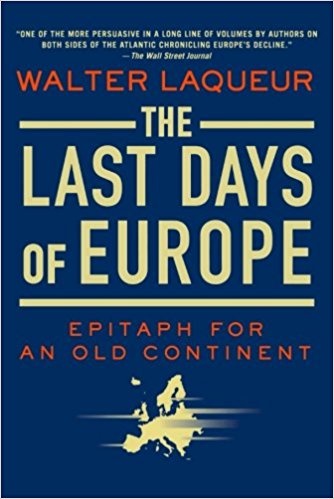
Walter Laqueur has written a very useful description of the challenges Europe faces in the 21st century. He is entirely right to point out that far-below-replacement fertility, combined with growing numbers of inassimilable immigrants add up to demographic catastrophe. He is also right to note that European welfare and social programs are headed for bankruptcy, and that rigid labor markets hobble economies. He writes that without firm measures, Europe will lose its civilization and be reduced to insignificance. Unfortunately, Mr. Laqueur follows these important insights with loony prescriptions. Few books draw so many bad conclusions from so many acute observations.
The Baby Bust
Many people have worried for a long time about the post-baby boom crash in European birthrates. For a population merely to replace itself, each woman must have an average of 2.2 children, but in most European countries the average lifetime fertility for white women is under 1.5. Mr. Laqueur notes that at this rate, the 15 members of the old European Union (before the East European additions in 2004) will have lost 60 million people by 2050. If projections include all of Europe, including Russia, the loss is expected to be 130 million. If there were no change in birthrates through the year 2300, most European countries would shrink to about five percent of their current size, and Russia and Italy to one percent. Already, says Mr. Laqueur, the Russian Far East is rapidly depopulating and thousands of villages have disappeared. He writes that in the Eastern part of Germany, 2,000 schools have shut in the wake of population decline and migration to the more prosperous West.
At the same time, non-Europeans have flooded in by different routes: “guest work,” asylum-seeking, and illegal immigration. How many? Mr. Laqueur doesn’t say. Whether out of conviction or prudence, he counts only Muslims; he thinks other non-whites will make fine Europeans. For many countries, the majority of non-whites are Muslims, so this face-saving distinction does not matter a great deal. However, Mr. Laqueur’s unwillingness to consider race helps explain his cross-eyed conclusions, and why he seems not to understand that the United States and Europe face the same crisis.
In any case, Mr. Laqueur’s count of Muslims is as follows:
France: 5.5 million (eight percent of the total population).
Germany: 3.6 million (five percent).
Britain: 1.6 million (three percent).
Holland: 1.0 million (six percent).
Sweden: 0.4 million (five percent).
Spain: 1.0 million (2.5 percent).
Belgium: 0.5 million (five percent).
Greece: 0.5 million (five percent).
Austria: 0.4 million (five percent).
These are low numbers compared to the United States, where non-whites account for more than a third of the population. Even France, with the worst immigrant problem, is only eight percent Muslim (France does not keep official statistics by race or religion, so this figure is only an estimate, but almost all of its non-whites are Muslims). Probably the country for which non-whites are most undercounted by considering only Muslims is Britain, where non-whites are an estimated ten percent of the population. In Holland, about nine percent are non-white.
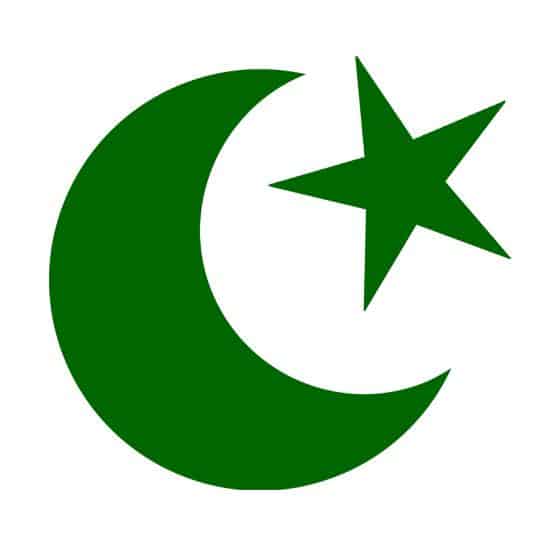
Even these relatively small numbers have caused huge problems — and, as Mr. Laqueur points out, the same problems — throughout Europe. Muslims concentrate in big cities, go on welfare, fail to assimilate, drop out, scorn work, commit crimes, and routinely blame the host country for all this. There are now Muslim parts of European cities where Turkish or Arabic is the only language one hears, and where Mecca Cola has replaced Coca Cola. Muslim preachers tell their flocks Islam is vastly superior to the values of Europe, and that assimilation is apostasy. These alien areas continue to expand.
Mr. Laqueur notes that for the older generation, the mosque is more than a religious center. It is a social and political club, day-care and kindergarten, that offers a network so complete they can ignore the greater society. Preachers are losing power over the second and third generations, however, many of whom grow up in street gangs. Families still manage to control most girls, but boys rear themselves. Of all the institutions in a Muslim child’s life, public schools have the least influence.
All over Europe, Muslims quickly learned to milk the welfare system. Mr. Laqueur writes that at first they were loathe to live on non-Islamic charity, but preachers soon explained that the faithful deserve whatever they can squeeze out of the infidel. Leftist social workers scampered around to tell them they were deserving victims of neo-imperialism.
In the densest, meanest Muslim areas, young men beat up whites who wander in. The working-class Europeans who used to live there left long ago, and not even the police come by without overwhelming force. Rape is a rite of passage, especially in France and to a lesser degree in Britain and Scandinavia. Europeans have not yet toughened up their juvenile codes as Americans have, so underage criminals have little fear of police. Crime rates in Europe now rival those of the United States. Mr. Laqueur notes that many immigrant gangs fight each other: Asians vs. blacks in Britain, Turks vs. blacks in Brussels. (Note to Mr. Laqueur: British and Belgian blacks are not Muslims and are, if anything, a worse problem).

The constant backdrop to this record of failure is the pose of snarling victimhood. Europeans have behaved just like Americans: excusing deviance, offering endless uplift programs, assuring whole generations that it is society’s fault they are shiftless thugs. Mr. Laqueur writes that perhaps the newcomers’ favorite complaint is that they are “excluded,” but they maintain a hostile, deliberate separation.
Mr. Laqueur offers well-informed summaries of Muslim immigration to each of the major European countries. In France, for example, the influx was a hangover from empire, and the vast majority of Muslims are Algerian or Moroccan. The French reject all forms of “multiculturalism,” and insist that newcomers learn French, become French, and abide by strictly non-religious norms of public life that date back to the Revolution. There is a small middle class that has assimilated and become essentially French, but for the rest, as Mr. Laqueur puts it, “an antisociety grew up infused with a burning hatred of the other France.” Hatred is the right word. Nique la France (F*** France) is a favorite graffito. When the French national soccer team plays Morocco or Algeria, immigrants boo “The Marseillaise,” and cheer the Arabs.
Mr. Laqueur notes that the number of mosques has grown from 260 in the mid-1980s to more than 2,000, though most are small. At the same time, younger immigrants are much less observant than their parents. Only 20 percent of French Muslims go to mosque on Friday, and only 33 percent pray every day. Teenagers complain that the religion of their elders is too demanding, and Mr. Laqueur suspects many will cease to be Muslims in all but name. He notes correctly that the rioters of 2005 showed no real religious motivation and ignored the clerics who told them to stop burning cars.
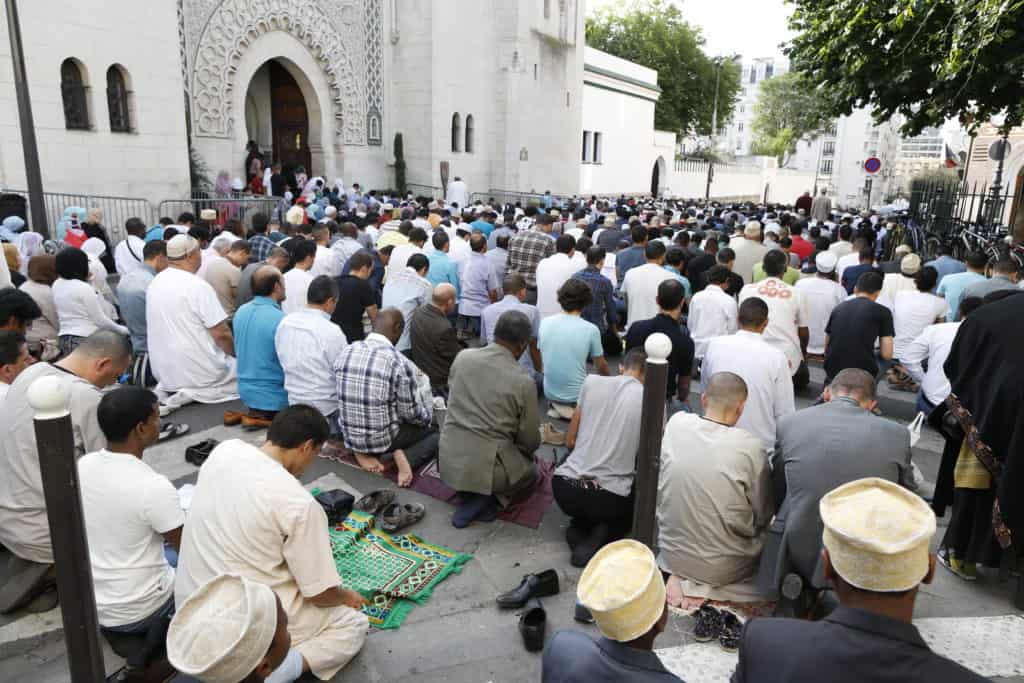
Muslims praying outside the Paris Great Mosque (Credit Image: © Fred De Noyelle / Godong / DPA via ZUMA Press)
Religious or not, immigrants are an extraordinary source of crime. Mr. Laqueur cites a Muslim population of eight percent, but he also cites an estimate that they are 70 percent of the prison population. If this is true, they are a staggering 28 times more likely to be in prison than non-Muslims.
France now has more no-go zones than any other European country, and Mr. Laqueur suggests that as these expand, their inhabitants will demand local autonomy. He notes that although racial or religious preferences run counter to France’s assimilationist tradition, he predicts they will be tried, but suspects they will do little good. For the immigrant problem as a whole “there are no obvious solutions.”
Germany acquired most of its Muslims as Turkish “guest workers,” who came in the boom times of the 1960s and refused to go home. Immigration policy was lax, and many brought families, sometimes illegally. Mr. Laqueur emphasizes that the Turks in Germany are not representative: Most immigrants were poor, illiterate, and far more religiously conservative than most Turks.
Mr. Laqueur says the Germans have made extraordinary efforts to help Turks fit in: “In no other country have immigrants been the subject of so many initiatives by so many well-intentioned institutions to promote their integration.” “Social workers and planners have submitted over the years hundreds and thousands of proposals for the improvement of the situation of the immigrants.” “Never before in the history of migration has there been so much concern and planning.” He notes that part of this effort was fueled by the fear of being thought “racist.”
Nothing has worked. Unlike most immigrants to France or Britain, Muslims arrived not speaking a word of the local language, and built up a parallel society even more hermetically sealed than that of French Muslims. One of the concessions to Turks was for the state to pay for religious instruction for Turkish children, but this only increased their isolation.
Mr. Laqueur writes that the Turkish government supports Turkish-German organizations that oppose assimilation and promote loyalty to Turkey. He adds that there are three Turkish-language television stations in Germany, and virtually every apartment has a satellite dish for broadcasts from the motherland. Young men police the neighborhood, kicking German children out of playgrounds and telling adults they are not welcome. For years, the churches tried “dialogue” with Muslim leaders, but were repeatedly rebuffed.
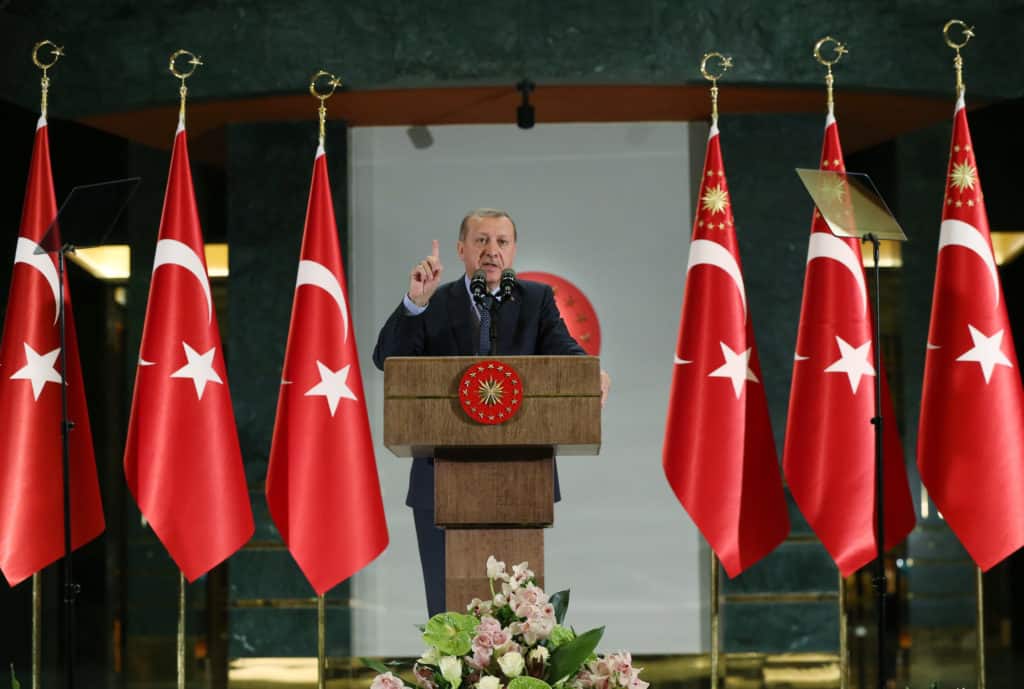
Turkish President Recep Tayyip Erdogan (Credit Image: © Turkish Presidency Press Service/Depo Photos via ZUMA Wire)
Mr. Laqueur tells us that unlike French Muslims, who clear out of the immigrant slums if they make it into the middle class, the ties of the mother culture are so strong that successful Turks usually stay in the ghetto. This keeps neighborhoods from descending into the squalor common in France, but Mr. Laqueur tells us that 85 percent of Turks are still in the underclass, and that one third of all non-German children have a brush with the law before age 18. Only three percent of Muslims make it to university, and though girls do better in school than boys, their families commonly forbid higher education. Because of the conservatism of the immigrants, Mr. Laqueur says Turkish women in Germany face more oppression and restrictions than women in Turkey.
In Britain, only about 30 percent of the non-whites are Muslim, but Mr. Laqueur concentrates on them. They are mostly from Pakistan and Bangladesh, and like the Turks who live in Germany, are mostly of peasant stock. They live in even more isolation than other non-white immigrants, importing wives from home, and openly proclaiming their religion as a bar to assimilation. Forty percent reportedly favor introducing Koranic law in parts of the country, and 13 percent approve of Al Qaeda-style terrorism.
As they do whenever they reach a certain concentration, Muslims stake out exclusive territory, most prominently in the Midlands areas of Bradford, Oldham and Burnley, where there were substantial race riots in 2001. White women dare not go out alone at night or even in the day when tensions are high. Decades ago, reports of “racist” attacks in Britain were mostly of non-whites complaining of assault by whites; now the situation is reversed.
One terrible mistake the British made was to let in so many Muslim extremists who were fugitives in their own lands. Men who faced execution for plotting Islamic overthrow of Arab governments found asylum and generous handouts in what came to be known as “Londonistan.” The French have been firm about booting out clerics who preach revolution and mayhem, and many of them ended up as guests of the British people as well. One theory has been that it is better to keep an eye on these people rather than drive them underground, but Britain has had more recent Muslim violence and threats of violence than any other European country.

Flowers are left at the 7/7 memorial in Hyde Park ahead of the tenth anniversary of the terrorist attacks. Hyde Park, London, Britain – 30 Jun 2015. (Credit Image: © Matthew Chattle / Rex Features / ZUMA Wire)
By ignoring blacks, Mr. Laqueur tries to make the British immigration crisis a Muslim crisis, but he lets a few facts slip through, noting that according to one London police chief, 80 percent of the crime in the London subway is committed by immigrants from Africa — these would be blacks, not Algerians or Moroccans. The first British race violence goes back to the 1958 Notting Hill riots — strictly a black affair — and Brixton, Handsworth, Broadwater Farm, and Toxteth are all names associated with black violence. The arrival of Muslims only added diversity to a decades-old tradition.
Although Mr. Laqueur rightly emphasizes the double calamity of population decline and the Third-World onslaught, he sees two other causes of inevitable European decline: over-generous welfare states and inflexible hiring rules, and the inability to establish a United States of Europe. There is no doubt that welfare is less a burden when populations are growing and economies booming. It is true that Europeans have become accustomed to a safety net so comfortable some call it a safety hammock. Workers also refuse to give up short hours and lavish benefits, and have made it impossible to fire incompetents. Taxes are already so high that increasing them will only chase away productive citizens.
Reforms are not impossible, though, as Margaret Thatcher showed in Britain, and even the Dutch and Scandinavians have managed to rein in the nanny state. Everyone knows what must be done; the question is whether politicians have the will to do it.
As for European unity, it is true that Europe might have more influence in the world if it had common military and foreign policies, but Mr. Laqueur is right to note that ordinary Europeans do not want to give up sovereignty or increase arms budgets just to match the United States in military swagger. Why should they? American adventuring only stirs up hatred. If the Europeans want to be useful in the Middle East, for example, a fleet of nuclear submarines will not help.

Congolese “Belgians”
Are There Solutions?
So, what is to be done about these pesky Muslims? Several times in the book, Mr. Laqueur says that the key is “education.” Done right, it will give Muslims a better attitude toward Europe and prepare them for work. This is, of course, the same refrain we have heard for 50 years in the US about blacks and now, Hispanics. Mr. Laqueur concedes that an entire generation has already grown up beyond the reach of Western Civilization, but the very young might be salvaged.
What makes him think this? He has already told us Germany has exerted itself more than any nation in history in the hopes of assimilating Turks. They and the Dutch have been models of multiculturalist concession while the French have insisted that Muslims be Frenchmen. Both approaches failed. Why should “education” suddenly work with the next generation when it failed everywhere with the last?
Mr. Laqueur tells us that as pop culture weakens the hold of Islam, young immigrants will become more like Europeans — as if rap “music,” drugs and promiscuity will pave the way to Western enlightenment. If he thinks this is a solution, it is because he fails to realize the problem is not Islam but race.
These young men (and many women) hate Europe because in their bones they know it is superior to anything their people ever achieved. They pretend to glory in their own traditions — just like American blacks celebrate obscure and even imaginary achievements — because those traditions amount to very little compared to the West. They hate Europe because they have no biological ties to it, and they will hate it long after they have shucked Islam.
Mr. Laqueur almost concedes as much. Despite his paean to education, he wonders whether immigrant children shouldn’t have separate schools, and whether Muslims in Italy should have to study the Renaissance and those in Holland be made learn about Van Gogh. This is to admit that in some essential way Third-World immigrants cannot be expected to become Europeans. And though he never mentions this, of course, there is no hope that biologically distinct aliens with average IQs in the 80s or low 90s will ever fit into societies with average IQs of 100.
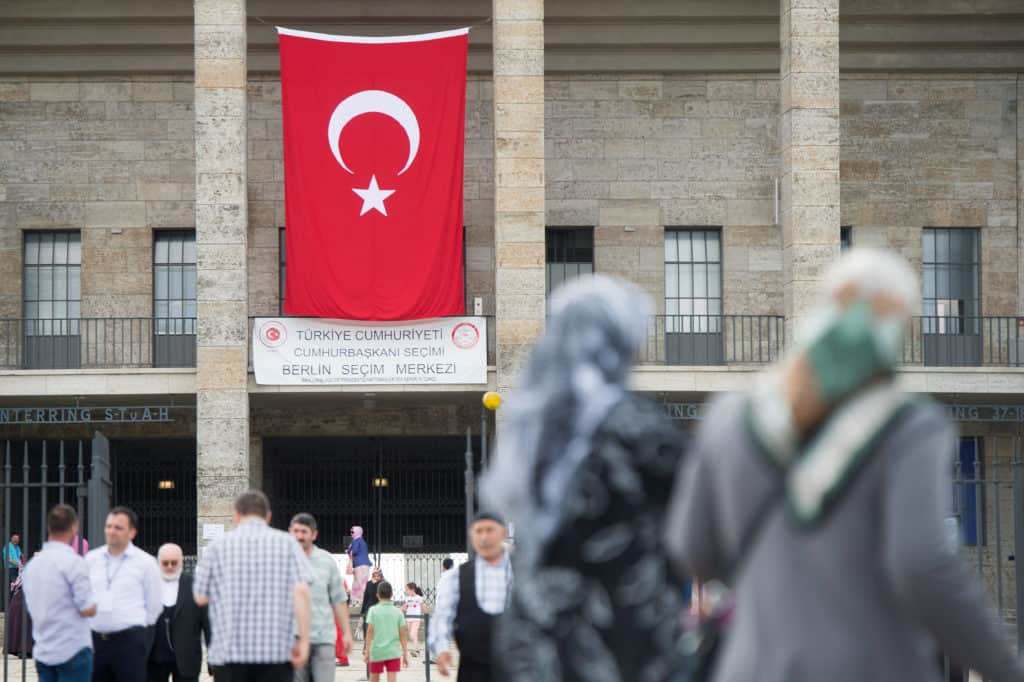
People, who are eligible to vote in Turkey leave the Olympic Stadium after voting in Berlin, Germany. (Credit Image: © Maurizio Gambarini / DPA / ZUMA Wire)
Mr. Laqueur himself calls his most carefully considered solutions “appeasement.” He wonders whether we should not start “expressing not only understanding but also respect and even admiration toward a civilization and way of life basically alien to [our] . . . own values.” He suggests that people living in Dutch and German cities should “acquire a working knowledge of Turkish or Arabic.” “A certain amount of self-censorship is already practiced by Western politicians and media [so as not to offend Muslims],” he notes, “and there may be more of it in the future.” He wonders hopefully if letting Turkey into the EU would make it “a bridge toward the Muslim world.” “[I]f a religion has 1.2 billion adherents, it is not advisable to talk openly and candidly abut its negative aspects.” (Does Christianity get the same consideration?)
Mr. Laqueur continues: “[F]or appeasement to be successful it may have to go considerably further, praising the beauty of Islam and the justice of the sharia, stressing that there is very much that the West (having lost its spiritual moorings) can learn from Muslim spirituality, also accepting the complaints that Muslims have been victims all along and that their grievances are justified and that the West has to make amends.”
But then he adds: “Whether a policy of massive appeasement will succeed is uncertain.” What is certain is that “massive appeasement” would be suicide, and it is surprising that someone who has described the consequences of Muslim immigration so convincingly would even consider it.
Mr. Laqueur writes as if only a few far-sighted observers — like him — even recognize the threat to Europe: “Future historians may well be at a loss to understand why the sorry state of affairs was realized only late in the day.” Enoch Powell saw the crisis coming in 1968. Jean Raspail wrote The Camp of the Saints in 1973. Jean-Marie Le Pen founded the National Front in 1972. Every European country has a political party that has been in a lather for decades about the problems Mr. Laqueur seems only now to have discovered.

Enoch Powell. (Credit Image: © PA Wire via ZUMA Press)
“It is difficult even in retrospect to establish what the authorities in those countries were thinking,” he writes loftily of Europeans who let in large numbers of Third-World immigrants. With all due respect, they were probably thinking exactly what Mr. Laqueur would have insisted they think. Would he have supported a zero-immigration policy, or one that limited newcomers to whites or Christians? Is he prepared to say that the White Australia Policy that kept out most of today’s Down Under trouble-makers was right after all?
Europe can, of course, be saved, and will be saved if enough people see what Mr. Laqueur sees but draw the correct conclusions. As The Last Days of Europe makes clear, Third World immigration has been a catastrophe. Mr. Laqueur argues that Europe may not even survive. There is therefore no mystery about what to do. Europe must stop Third World immigration, deport all illegal immigrants, and persuade legal immigrants to go home.
Europe’s leaders must have the courage to admit they made a terrible mistake that threatens their civilization. Every effort now directed toward assimilation should be directed toward repatriation. Mr. Laqueur tells us the Germans spend more than 100 million Euros a year on “integration.” This money is completely wasted — as he explains, Turks don’t want to integrate — and should be spent on repatriation. Both France and Germany have, from time to time, paid Turks and Arabs to leave, but these policies were never systematic or sustained.
Would a policy that recognizes immigrants as a threat and a burden provoke more hatred than one that pretends they are an invaluable source of diversity? No. Immigrants know very well what the average Frenchman or German thinks of them, and low-bred people despise weakness. There would be fewer brown-skinned thugs and truants if Europeans had backbone.
A small number of Third Worlders identify completely with the West. By all means let them stay, but the rest should be encouraged to leave. At the same time, Europeans should introduce natalist incentives, but only for natives. Only firm policies will defeat forces Mr. Laqueur recognizes to be a mortal threat.
Unfortunately, it is unlikely Europeans will do these things any time soon. With characteristic skill, Mr. Laqueur catches something of the prevailing mood when he describes the leftist view of immigration:
“Others might not have cared, believing that their countries (and Europe in general) had no particular contribution to make anymore, that they had more or less fulfilled their historical mission (if there ever had been one), and that maintaining their social and cultural identity was not a matter of paramount importance in the modern world. With the nations suffering from exhaustion, perhaps the time had come to hand over the torch of civilization to other peoples, religions, and ethnic groups.”
A nation can endure a lunatic fringe that wants to commit love suicide with aliens. When that fringe becomes the mainstream, oblivion is only a matter of time.















